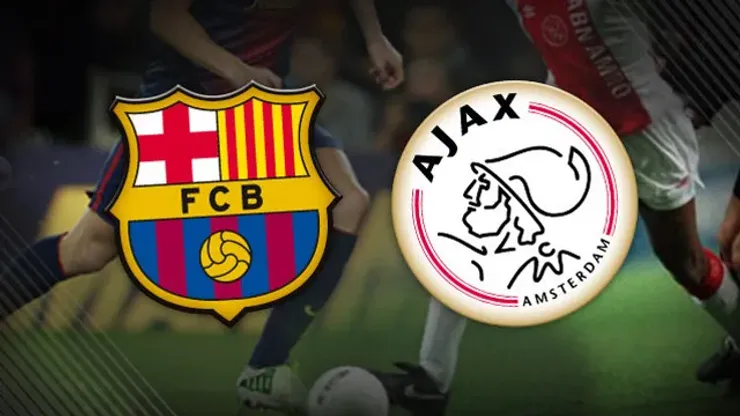AFC Ajax and FC Barcelona — has there ever been a pair of clubs, not from the same country, whose legacies and histories are so intertwined?
Ajax, the Dutch masters of the 1970s, the team that invented Total Football and whose players catapulted the Netherlands to two straight World Cup Finals (and two straight losses) in 1974 and 1978.
Barcelona, the modern game’s most dominant, if not always its most exciting team.
Even in Wednesday’s Champions League group stage encounter at the Camp Nou, there were reminders of the two clubs’ shared legacies. Ajax coach Frank De Boer enjoyed celebrated stints at both clubs during his playing career. Ajax forward Bojan Krkic meanwhile was a product of Barcelona’s famed La Masia youth academy.
But these shared bits of legacy aside; Wednesday’s clash starkly illustrated just how far the fortunes of the two clubs have diverged. Ajax, now regarded as a “selling club,” had just had their best players cherry-picked by the likes of Tottenham and Atletico Madrid. Barcelona, meanwhile, has just signed the most heralded Brazilian attacker of this generation.
And while it’s difficult for those of us of a certain vintage to fully accept the idea of Ajax Amsterdam as a Champions League minnow, that’s largely what they’ve become. Apart from a rather surprising upset over Manchester City last season, in the past few years, whenever the Amsterdam side has come up against one of European soccer’s big boys, they’ve been taken apart.
Last night’s 4-0 win for Barcelona saw the trend continued. Victor Valdez’s penalty save against Kolbeinn Sigthorson even robbed Ajax of the valuable away goal that may have offered the chance of a lifeline.
Yet one really only need to look back to the middle 1990s to see a time when Ajax and Barcelona were on equal footing. And then, as at almost any time since the early ‘70s, the clubs fortunes were equally intertwined.
It was the era of the Barcelona “dream team” coached by the great Johan Cruyff, who as a player, brought the Dutch total football style to the Catalan capital along with his former Ajax coach, Rinus Michels. At Barca in the ‘70s the two implemented the passing and possession style of Dutch total football, delivering a string of La Liga titles and Spanish Cups.
Twenty years later, in 1994, Cruyff coached Barcelona to their very first Champions League title, fielding a side that contained a young playmaker called Pep Guardiola.
But just one year later, it would be Louis Van Gaal’s Ajax lifting “the cup with the big ears” as the club celebrated its first European Cup triumph since it had won three in a row in the early ‘70s. The following year, Ajax reached the final yet again, only to lose.
And while it would be another decade before Barcelona celebrated its second Champions League final, that same decade cemented the perception of Ajax as the world’s “football factory.”
Indeed, many of the greatest players in the modern game came through the ranks at Ajax; Zlatan Ibrahimovic, Wesley Sneijder, Thomas Vermaelen, Luis Suarez and most recently, Christian Eriksen, all made their names at Ajax before going on to bigger clubs.
Now in a group that also includes AC Milan (a team that was once one of Ajax’s direct rivals) and Celtic, the odds of the Amsterdam side making it out of the group seem rather slim. Barca meanwhile, should steamroll their way through the group and despite most pundits tipping Real Madrid and Bayern Munich as favorites to win this year, will likely still be in the conversation when it comes to the business end of the competition.
The idea of Ajax reversing its fortunes and reestablishing itself as a European power seems as distant as ever. The current state of Dutch football, taxes and salary caps makes it difficult for the club to recruit and maintain top talent.
A couple of years ago, a committee whose membership included Johan Cruyff, Louis Van Gaal, among others, was assembled and tasked with plotting a course back to the top for the Amsterdam club. In typical Dutch fashion, they set about arguing and hating one another and the whole project collapsed.
And so for the time being Ajax are likely to remain what they’ve been for the past decade or more; a selling club, the world’s football factory.
200+ Channels With Sports & News
- Starting price: $33/mo. for fubo Latino Package
- Watch Premier League, Women’s World Cup, Euro 2024 & Gold Cup
The New Home of MLS
- Price: $14.99/mo. for MLS Season Pass
- Watch every MLS game including playoffs & Leagues Cup
Many Sports & ESPN Originals
- Price: $10.99/mo. (or get ESPN+, Hulu & Disney+ for $14.99/mo.)
- Features Bundesliga, LaLiga, Championship, & FA Cup
2,000+ soccer games per year
- Price: $5.99/mo
- Features Champions League, Serie A, Europa League & Brasileirāo
175 Premier League Games & PL TV
- Starting price: $5.99/mo. for Peacock Premium
- Watch 175 exclusive EPL games per season






